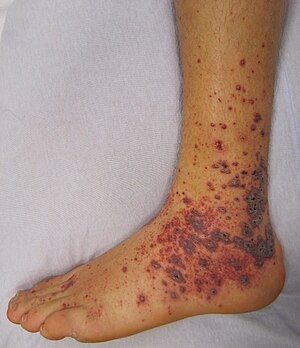Purpura
| Purpura | |
|---|---|
 |
|
| Petechiae and purpura on the lower limb due to medication induced vasculitis | |
| Classification and external resources | |
| Specialty | Dermatology, hematology |
| ICD-10 | D69 |
| ICD-9-CM | 287 |
| DiseasesDB | 25619 |
| MedlinePlus | 003232 |
| MeSH | D011693 |
Purpura is a condition of red or purple discolored spots on the skin that do not blanch on applying pressure. The spots are caused by bleeding underneath the skin usually secondary to vasculitis or dietary deficiency of vitamin C (scurvy). They measure 0.3–1 cm (3–10 mm), whereas petechiae measure less than 3 mm, and ecchymoses greater than 1 cm.
Purpura is common with typhus and can be present with meningitis caused by meningococci or septicaemia. In particular, meningococcus (Neisseria meningitidis), a Gram-negative diplococcus organism, releases endotoxin when it lyses. Endotoxin activates the Hageman factor (clotting factor XII), which causes disseminated intravascular coagulation (DIC). The DIC is what appears as a rash on the affected individual.
Purpura are a common and nonspecific medical sign; however, the underlying mechanism commonly involves one of:
Cases of psychogenic purpura are also described in the medical literature, some claimed to be due to "autoerythrocyte sensitization". Other studies suggest the local (cutaneous) activity of tissue plasminogen activator can be increased in psychogenic purpura, leading to substantial amounts of localized plasmin activity, rapid degradation of fibrin clots, and resultant bleeding. Petechial rash is also characteristic of a rickettsial infection.
The word purpura (/ˈpɜːrpɜːrə/) comes from Latin purpura, "purple", which came from ancient Greek πορφύρα. Purpura is a mass noun naming the condition or state, not the name of an individual spot (thus there is no *pupurum, *purpura or *purpura, *purpurae count declension).
...
Wikipedia
